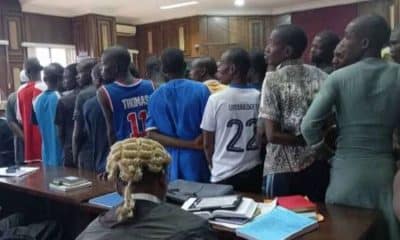Nigeria News
Nigerian Govt Freezes More Than $37 Million Worth Of Cryptocurrency Belonging To #EndBadGovernance Organisers

A report has indicated that the Nigerian government has frozen more than $37 million worth of cryptocurrency held in wallets believed to be owned by some organisers of #EndBadGovernance protests.
The freezing followed an order by the Federal High Court in Abuja.
In a copy of the ruling seen by Premium Times, the judge, Emeka Nwite, gave the order on 9 July.
Nwite issued the order based on an application by the Economic and Financial Crimes Commission (EFCC).
In the ex parte application filed on 8 August and heard by the court on the following day, the EFCC described the assets as proceeds of money laundering and terrorism financing.
There was no objection to the application during the hearing, which was proceeded like an exchange of views between the judge and EFCC’s lawyer, O.S Ujam.
“That an order of this honourable court is hereby made freezing the wallet addresses/accounts stated in the schedule below, which wallets are owned by individuals currently being investigated for offences of money laundering and terrorism financing, pending the conclusion of the investigation”, Nwite ruled shortly after listening to the EFCC’s lawyer.
The wallet with the lion’s share of the assets has USDT37 million (USDT37,061,867,869.3) cryptocurrency, which equals the exact value in American US dollars.
Each of the three other wallets has USDT967, USDT90, and USDT443,512.37, respectively.
EFCC did not reveal the identities of the wallet owners in its application.
However, insiders briefed about the case informed the aforementioned publication that the federal government traced them to suspected organisers of the #EndBadGovernance protests.
An affidavit filed in support of the application for the court order to freeze the cryptocurrency wallets said the assets “are owned by individuals currently being investigated for offences of money laundering and terrorism financing.”
The affidavit was sworn to by an EFCC official, Jimada Yusuf.
At the hearing of the application on 9 July, EFCC’s lawyer, Ujam, urged the judge to order the freezing of the wallets “pending the conclusion of the investigation and prosecution.”
There was no adverse parties in court to oppose the application since it was an ex-parte hearing usually conducted without the opponents in attendance.
In cases where a legal process begins with an ex parte application, the adverse parties are not served until the court orders service of the outcome of the hearing and other filings.
After listening to EFCC’s lawyer on 9 July, the judge ordered, “That the applicant’s application dated and filed on 8th day of August 2024 is granted as prayed.”











